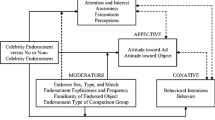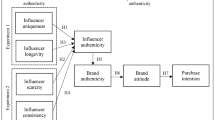Abstract
On one hand, Chinese consumers are well known for conspicuous consumption and the adoption of luxury products and named brands. On the other hand, they also have a bad reputation for buying counterfeit products. Their simultaneous preferences for two contrasting types of product present a paradox that has not been addressed in the literature. This study attempts to present an explanation of this paradox by examining the effects of traditional Chinese cultural values and consumer values on consumers’ deontological judgment of pirated CDs and the amount of social benefits they perceive they gain from them. We interviewed 300 Hong Kong Chinese consumers, and found that face consciousness increased materialism and risk aversion, thereby producing a favorable deontological judgment of pirated CDs. Face consciousness also has a direct effect on the amount of social benefits perceived in pirated CDs. Both favorable deontological judgment and perceived social benefits contributed to a strong intention to buy pirated CDs. The results are discussed in a cultural perspective.
Similar content being viewed by others
References
Ajzen I., T. J. Madden: 1986, Prediction of Goal-Directed Behavior: Attitudes, Intentions and Perceived Behavioral Control, Journal of Experimental Social Psychology 22, 453–474
Ang S. H., P. S. Cheng, E. A. C. Lim, S. K. Tambyah: 2001, Spot the Difference: Consumer Responses Towards Counterfeit, Journal of Consumer Marketing 18(3), 219–235
Bao Y., K. Z. Zhou, C. Su: 2003, Face Consciousness and Risk Aversion: Do they Affect Consumer Decision-Making? Psychology & Marketing 20(8), 733–755
Baumgartner H., J. E. M. Steenkamp: 1996, Exploratory Consumer Buying Behaviour: Conceptualization and Measurement. International Journal of Research in Marketing 13(April), 121–137
Belk, R. W.: 1983, Worldly Possession: Issues and Criticisms. In R. P. Bagozzi, A. M. Tybout (Eds.), Advances in Consumer Research (pp. 514–519). Ann Arbor, MI: Association for Consumer Research
Berry J. W., Y. H. Poortinga, M. H. Segall, P. R. Dasen: 1992, Cross-Cultural Psychology: Research and Applications. Cambridge University Press, Cambridge
Berthrong J. H., E. N. Berthrong: 2000, Confucianism: A Short Introduction. Oneworld, Oxford
Bloch P. H., R. F. Bush, L. Campbell: 1993, Consumer “Accomplices” in Product Counterfeiting, Journal of Consumer Marketing 10(4), 27–36
Bond M. H.: 1991, Beyond the Chinese Face: Insights from Psychology. Oxford University Press, Hong Kong
Chan A., S. Wong, P. Leung: 1998, Ethical Beliefs of Chinese Consumers in Hong Kong, Journal of Business Ethics 17(11), 1163–1170
Chen S. X., M. H. Bond, D. Tang: 2007, Decomposing Filial Piety into Filial Attitudes and Filial Enactments, Asian Journal of Social Psychology 10(4), 213–223
Deng S., P. Townsend, M. Robert, N. Quesnel: 1996, A Guide to Intellectual Property Rights in Southeast Asia and China, Business Horizon 39(6), 43–51
Fournier S., M. L. Richins: 1991, Some Theoretical and Popular Notions Concerning Materialism, Journal of Social Behavior and Personality 6, 403–414
Fullerton S., K. B. Kerch, H. R. Dodge: 1996, Consumer Ethics: An Assessment of Individual Behavior in the Market Place, Journal of Business Ethics 15(7), 805–814
Gabrenya W. K. Jr, K. K. Hwang: 1996, Chinese Social Interaction: Harmony and Hierarchy on the Good Earth. In M. H. Bond (Ed.), The Handbook of Chinese Psychology (pp. 309–321). Hong Kong: Oxford University Press
Hofstede, G.: 1980, Culture’s Consequences: National Differences in Thinking and Organizing. Sage Press, Beverly Hills, CA
Hofstede G., M. H. Bond, C. L. Luk: 1993, Individual Perceptions of Organizational Cultures: A Methodological Treatise on Levels of Analysis, Organization Studies 14(4), 483–503
Kwong K. K., O. H. M. Yau, J. S. Y. Lee, L. Y. M. Sin, A. C. B. Tse: 2003, The Effects of Attitudinal and Demographic Factors on Intention to Buy Pirated CDs: The Case of Chinese Consumers, Journal of Business Ethics 47(3), 223–235
Li J. J., C. Su: 2007, How Face Influences Consumption: A Comparative Study of American and Chinese Consumers, International Journal of Market Research 49(2), 237–256
Lonner W. J., J. Adamopoulos: 1997, Culture as Antecedent to Behavior. In J. W. Berry, Y. H. Poortinga, J. Pandey (Eds.), Handbook of Cross-Cultural Psychology, 2nd Edition (Vol. 1, pp. 43–83). Boston: Allyn and Bacon
Luk, C. L., O. H. M. Yau, L. Y. M. Sin, A. C. B. Tse, R. P. M. Chow and J. S. Y. Lee: 2008, ‘The Effects of Social Capital and Organizational Innovativeness in Different Institutional Contexts’, Journal of International Business Studies ( 39(4), 589–612
Luk C. L., O. H. M. Yau, A. C. B. Tse, L. Y. M. Sin, R. P. M. Chow: 2005, Stakeholder Orientation and Business Performance: The Case of Service Companies in China, Journal of International Marketing 13(1), 89–110
McCracken, G.: 1986, Culture and Consumption: A Theoretical Account of the Structure and Movement of the Cultural Meaning of Consumer Goods, Journal of Consumer Research 13(June), 71–84
Moores T., G. Dhillon: 2000, Software Piracy: A View from Hong Kong, Communications of the ACM 43(12), 88–93
Muncy J. A., J. K. Eastman: 1998, Materialism and Consumer Ethics: An Exploratory Study, Journal of Business Ethics 17(2), 137–145
Nill A., C. J. Shultz II: 1996, The Scourge of Global Counterfeiting, Business Horizons 39(6), 37–42
Nunnally J. C. 1978, Psychometric Theory. McGraw-Hill, New York
Richins M. L.: 1994, Special Possessions and the Expression of Material Values. Journal of Consumer Research 21(3), 522–533
Richins M. L., S. Dawson: 1992, A Consumer Values Orientation for Materialism and Its Measurement: Scale Development and Validation, Journal of Consumer Research 19(3), 303–316
Simone, J. T.: 1999, ‘Countering Counterfeiters’, The China Business Review January–February, 12–19
Soontiens W.: 2007, Chinese Ethnicity and Values: A Country Cluster Comparison, Cross Cultural Management 14(4), 321–335
Swinyard W. R., R. Heikki, A. K. Kau: 1990, The Morality of Software Piracy: A Cross-Cultural Analysis, Journal of Business Ethics 9(8), 655–664
Tom G., B. Garibaldi, Y. Zeng, J. Pilcher: 1998, Consumer Demand for Counterfeit Goods, Psychology & Marketing 15(5), 405–421
Tse D. K. 1996, Understanding Chinese People as Consumers: Past Findings and Future Propositions. In M. H. Bond (Ed.), The Handbook of Chinese Psychology (pp. 352–363). Oxford University Press, Hong Kong
USINFO: 2007, ‘Protecting Intellectual Property Rights’, available at: http://usinfo.state.gov/ei/economic_issues/intellectual_property.html (accessed August 14, 2007)
Wan W. W. N., C. L. Luk, C. W. C. Chow: 2005, Customers’ Adoption of Banking Channels in Hong Kong. International Journal of Bank Marketing 23(3), 255–272
Wong N. Y., A. C. Ahuvia: 1998, Personal Taste and Family Face: Luxury Consumption in Confucian and Western Societies. Psychology & Marketing 15(5), 423–441
Yau O. H. M. 1988, Chinese Cultural Values: Their Dimensions and Marketing Implications. European Journal of Marketing 22(5), 44–56
Acknowledgments
This research was supported by the CityU Small-Scale Research Grant (9030977–880) from the City University of Hong Kong. The Unit for Chinese Management Development, Department of Marketing, City University of Hong Kong also provided funds for the research. The authors thank the two anonymous JBE reviewers for their helpful comments on an earlier draft of this article.
Author information
Authors and Affiliations
Corresponding author
Rights and permissions
About this article
Cite this article
Wan, W.W.N., Luk, CL., Yau, O.H.M. et al. Do Traditional Chinese Cultural Values Nourish a Market for Pirated CDs?. J Bus Ethics 88 (Suppl 1), 185–196 (2009). https://doi.org/10.1007/s10551-008-9821-1
Published:
Issue Date:
DOI: https://doi.org/10.1007/s10551-008-9821-1




